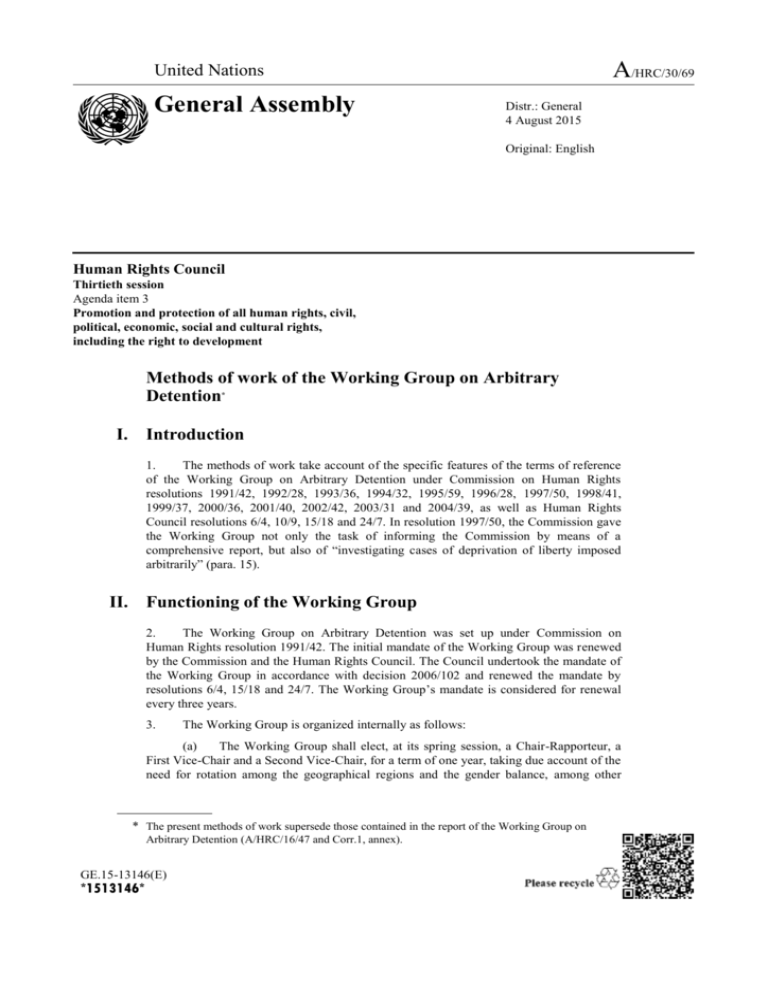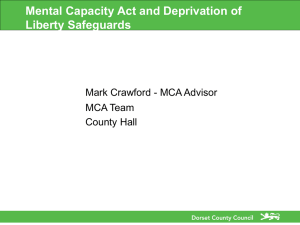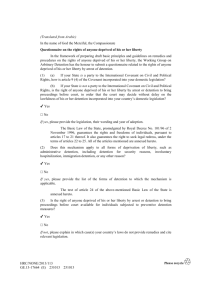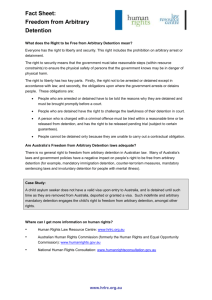Methods of work of the Working Group on Arbitrary Detention in
advertisement

A/HRC/30/69 United Nations General Assembly Distr.: General 4 August 2015 Original: English Human Rights Council Thirtieth session Agenda item 3 Promotion and protection of all human rights, civil, political, economic, social and cultural rights, including the right to development Methods of work of the Working Group on Arbitrary Detention* I. Introduction 1. The methods of work take account of the specific features of the terms of reference of the Working Group on Arbitrary Detention under Commission on Human Rights resolutions 1991/42, 1992/28, 1993/36, 1994/32, 1995/59, 1996/28, 1997/50, 1998/41, 1999/37, 2000/36, 2001/40, 2002/42, 2003/31 and 2004/39, as well as Human Rights Council resolutions 6/4, 10/9, 15/18 and 24/7. In resolution 1997/50, the Commission gave the Working Group not only the task of informing the Commission by means of a comprehensive report, but also of “investigating cases of deprivation of liberty imposed arbitrarily” (para. 15). II. Functioning of the Working Group 2. The Working Group on Arbitrary Detention was set up under Commission on Human Rights resolution 1991/42. The initial mandate of the Working Group was renewed by the Commission and the Human Rights Council. The Council undertook the mandate of the Working Group in accordance with decision 2006/102 and renewed the mandate by resolutions 6/4, 15/18 and 24/7. The Working Group’s mandate is considered for renewal every three years. 3. The Working Group is organized internally as follows: (a) The Working Group shall elect, at its spring session, a Chair-Rapporteur, a First Vice-Chair and a Second Vice-Chair, for a term of one year, taking due account of the need for rotation among the geographical regions and the gender balance, among other * The present methods of work supersede those contained in the report of the Working Group on Arbitrary Detention (A/HRC/16/47 and Corr.1, annex). GE.15-13146(E) *1513146* A/HRC/30/69 considerations. They shall take office at the end of the same session. Each officer can be reelected; (b) The Chair-Rapporteur shall perform the functions conferred upon her or him by the resolution that creates or renews the mandate of the Working Group, the methods of work and the decisions of the Working Group. The Chair-Rapporteur shall represent the Working Group before the Human Rights Council, States and other relevant stakeholders. She or he shall chair the sessions of the Working Group; (c) The First Vice-Chair should be the focal point of the Working Group on individual complaints, while the Second Vice-Chair should be the focal point of the Working Group on follow-up on all actions taken by the Working Group; (d) In the exercise of their functions, the Chair-Rapporteur and the Vice-Chairs shall remain under the authority of the Working Group. In the absence of the ChairRapporteur, the First Vice-Chair, or alternatively the Second Vice-Chair, shall temporarily assume the assigned functions of the Chair-Rapporteur as required by the circumstances. In the absence of either Vice-Chair, the remaining Vice-Chair should temporarily assume the assigned functions of the absent Vice-Chair; (e) Each of these three officers shall report fully to the Working Group at the beginning of each session on activities they have undertaken during the intersession, and on any activity undertaken during a session without the other members of the Working Group; (f) interest. The Working Group can appoint at any time a rapporteur on specific issues of 4. The Working Group meets at least three times a year, for at least five to eight working days, generally in Geneva. 5. When the case under consideration or the country visit concerns a country of which one of the members of the Working Group is a national, or in other situations where there may be a conflict of interest, that member shall not participate in the discussion of the case, in the visit or in the preparation of the report on the visit. 6. During the course of its deliberations, when dealing with individual cases or situations, the Working Group renders opinions, which are incorporated into its annual report submitted to the Human Rights Council. The opinions of the Working Group are the result of consensus; where consensus is not reached, the view of a majority of the members of the Working Group is adopted as the view of the Working Group. III. Implementation of the mandate of the Working Group 7. The mandate of the Working Group is to investigate cases of deprivation of liberty imposed arbitrarily. In the discharge of its mandate, the Working Group refers to the relevant international standards set forth in the Universal Declaration of Human Rights, as well as to the relevant international instruments accepted by the States concerned, in particular the International Covenant on Civil and Political Rights; the Convention relating to the Status of Refugees of 1951 and the International Convention on the Elimination of All Forms of Racial Discrimination, as well as, when appropriate, the following standards: (a) Body of Principles for the Protection of All Persons under Any Form of Detention or Imprisonment; 2 (b) Standard Minimum Rules for the Treatment of Prisoners; (c) United Nations Rules for the Protection of Juveniles Deprived of their Liberty; A/HRC/30/69 (d) United Nations Standard Minimum Rules for the Administration of Juvenile Justice (“The Beijing Rules”); (e) Convention on the Rights of the Child; (f) International Convention on the Protection of the Rights of All Migrant Workers and Members of Their Families, as well as any other relevant standard. 8. As a general rule, in dealing with situations of arbitrary deprivation of liberty within the meaning of paragraph 15 of resolution 1997/50, the Working Group shall refer, in the discharge of its mandate, to the following five legal categories: (a) When it is clearly impossible to invoke any legal basis justifying the deprivation of liberty (as when a person is kept in detention after the completion of his sentence or despite an amnesty law applicable to him) (category I); (b) When the deprivation of liberty results from the exercise of the rights or freedoms guaranteed by articles 7, 13, 14, 18, 19, 20 and 21 of the Universal Declaration of Human Rights and, insofar as States parties are concerned, by articles 12, 18, 19, 21, 22, 25, 26 and 27 of the International Covenant on Civil and Political Rights (category II); (c) When the total or partial non-observance of the international norms relating to the right to a fair trial, established in the Universal Declaration of Human Rights and in the relevant international instruments accepted by the States concerned, is of such gravity as to give the deprivation of liberty an arbitrary character (category III); (d) When asylum seekers, immigrants or refugees are subjected to prolonged administrative custody without the possibility of administrative or judicial review or remedy (category IV); (e) When the deprivation of liberty constitutes a violation of international law on the grounds of discrimination based on birth, national, ethnic or social origin, language, religion, economic condition, political or other opinion, gender, sexual orientation, disability, or any other status, that aims towards or can result in ignoring the equality of human beings (category V). IV. Submission and consideration of communications A. Submission of communications to the Working Group 9. Communications shall be submitted in writing and addressed to the secretariat, giving the family name, first name and address of the sender and (optionally) his or her telephone, telex and telefax numbers or e-mail address. 10. As far as possible, each case shall form the subject of a presentation indicating the circumstances of the arrest or detention and the family name, first name and any other information making it possible to identify the person detained, as well as the latter’s legal status, particularly: (a) The date and place of the arrest or detention or of any other form of deprivation of liberty and the identity of those presumed to have carried them out, together with any other information shedding light on the circumstances in which the person was deprived of liberty; (b) The reasons given by the authorities for the arrest, detention or the deprivation of liberty; (c) The legislation applied in the case; 3 A/HRC/30/69 (d) The action taken, including investigatory action or the exercise of internal remedies, by the administrative and judicial authorities, as well as the steps taken at the international or regional levels, and the results of such action or the reasons why such measures were ineffective or were not taken; (e) An account of the reasons why the deprivation of liberty is deemed arbitrary; (f) A report of all elements presented by the source that aim to inform the Working Group on the full status of the reported situation, such as the beginning of a trial; the granting of provisional or definitive release; and changes of incarceration conditions or venue or of any other similar circumstances. An absence of information or an absence of a response by the source may lead the Working Group to terminate its consideration of the case. 11. In order to facilitate the Working Group’s work, it is hoped that communications will be submitted using the model questionnaire available from the Working Group’s secretariat. 12. Communications addressed to the Working Group may be received from the individuals concerned, their families or their representatives. Such communications may also be transmitted by Governments and intergovernmental and non-governmental organizations as well as by national institutions for the promotion and the protection of human rights. In dealing with communications, the Working Group will give consideration to articles 9, 10 and 14 of the Code of Conduct for Special Procedures Mandate-Holders of the Human Rights Council. 13. In accordance with the provisions of paragraph 4 of Human Rights Commission resolution 1993/36, the Working Group may, on its own initiative, take up cases that might constitute arbitrary deprivation of liberty. 14. When the Working Group is not in session, the Chair-Rapporteur, or in her/his absence the First Vice-Chair (see para. 3 (c) and (d)), may decide to bring the case to the attention of the Government. B. Consideration of communications 15. In the interest of ensuring mutual cooperation, communications shall be brought to the attention of the Government and the reply of the latter shall be brought to the attention of the source of the communication for its further comments. They shall be transmitted by the ChairRapporteur of the Working Group or, if she or he is not available, by the First Vice-Chair (see para. 3 (c) and (d)). In the case of Governments, the letter shall be transmitted through the Permanent Representative to the United Nations Office at Geneva. In the letter the Working Group shall request the Government to reply within 60 days, during which appropriate inquiries may be carried out by the Government so as to furnish the Working Group with the fullest possible information. In the letter the Working Group shall also inform the Government that the Working Group is authorized to render an opinion determining whether the reported deprivation of liberty was arbitrary or not. If a reply is not received from the Government within the time limit, the Working Group may render an opinion on the basis of the information submitted by the source. 16. However, if the Government desires an extension of this time limit, it shall inform the Working Group of the reasons for requesting one, so that it may be granted a further period of a maximum of one month in which to reply. Even if no reply has been received upon expiry of the time limit set, the Working Group may render an opinion on the basis of all the information it has obtained. 4 A/HRC/30/69 C. Action taken on communications 17. In the light of the information obtained, the Working Group shall take one of the following measures: (a) If the person has been released, for whatever reason, following the referral of the case to the Working Group, the case is filed through an opinion. The Working Group reserves the right to render an opinion, on a case-by-case basis, whether or not the deprivation of liberty was arbitrary, notwithstanding the release of the person concerned; (b) If the Working Group considers that the case is not one of arbitrary detention, it shall render an opinion to that effect. The Working Group can also make recommendations in this case if it considers it necessary; (c) If the Working Group considers that further information is required from the Government or from the source, it may keep the case pending until that information is received; (d) If the Working Group considers that the arbitrary nature of the detention is established, it shall render an opinion to that effect and make recommendations to the Government. 18. The opinions rendered by the Working Group shall be transmitted to the Government concerned. Two weeks after their transmittal, they shall be communicated to the source. 19. The opinions rendered by the Working Group shall be brought to the attention of the Human Rights Council in its annual report. 20. Governments, sources and other parties should inform the Working Group of the follow-up action taken on the recommendations made by the Working Group in its opinion. This will enable the Working Group to keep the Human Rights Council informed of the progress made and of any difficulties encountered in implementing the recommendations, as well as of any failure to take action. D. Procedure of review of opinions 21. In exceptional circumstances, the Working Group may, at the request of the Government concerned or the source, reconsider its opinions under the following conditions: (a) If the facts on which the request is based are considered by the Working Group to be entirely new and such as to have caused the Working Group to alter its decision had it been aware of them; (b) If the facts had not been known or had not been accessible to the party originating the request; (c) In the case where the request comes from a Government, on condition that the latter has observed the time limit for reply referred to in paragraphs 15-16 above. V. Urgent action procedure 22. A procedure known as “urgent action” may be resorted to in the following cases: (a) In cases in which there are sufficiently reliable allegations that a person is being arbitrarily deprived of his liberty and that the continuation of such deprivation 5 A/HRC/30/69 constitutes a serious threat to that person’s health, physical or psychological integrity or even to her or his life; (b) In cases in which, even when no such threat is alleged to exist, there are particular circumstances that warrant an urgent action. 23. After having transmitted an urgent appeal to the Government, the Working Group may transmit the case through its regular procedure in order to render an opinion on whether the deprivation of liberty was arbitrary or not. Such appeals — which are of a purely humanitarian nature — in no way prejudge any opinion the Working Group may render. The Government is required to respond separately for the urgent action procedure and the regular procedure. 24. The Chair-Rapporteur, or in his or her absence the First Vice-Chair (see para. 3 (c) and (d)), shall transmit the appeal by the most rapid means to the Minister for Foreign Affairs through the Permanent Mission of the country concerned. VI. Country visits 25. For the purposes of completing its task, the Working Group frequently pays visits on official mission. These visits are prepared in collaboration with the Government, the United Nations agencies in the field and civil society representatives. The visits are an opportunity for the Working Group to engage in direct dialogue with the Government in question and with representatives of civil society, with the aim of better understanding the situation of deprivation of liberty in the country and the underlying reasons for arbitrary detention. An important part of these missions are visits to detention centres, including penitentiaries, prisons, police stations, detention centres for migrants and psychiatric hospitals. 26. When the Working Group receives an invitation by a Government to conduct a country visit, the Working Group responds by inviting the Permanent Representative of the State to the United Nations Office at Geneva to a meeting to determine the dates and terms of the country visit. The secretariat of the Working Group initiates a dialogue with the parties involved in the visit with a view to taking all practical measures to facilitate the mission. The preparation for the visit is conducted in close cooperation with diplomatic authorities of the host country and United Nations agencies. 27. The Government must assure the Working Group that, during the visit, the Working Group will have the opportunity to conduct meetings with the highest authorities of the branches of the State (political, administrative, legislative and judicial authorities) and that it will be able to visit penitentiaries, prisons, police stations, immigration detention centres, military prisons, detention centres for juveniles and psychiatric hospitals. It will be able to meet with all the authorities and officials who affect the personal liberty of persons subjected to the jurisdiction of the host State. The Working Group shall also conduct meetings with international bodies and agencies as well as non-governmental organizations, lawyers, bar associations and other professional associations of interest, national human rights institutions, diplomatic and consular representatives and religious authorities. Absolute confidentiality shall be guaranteed during the interviews between the Working Group and persons deprived of their liberty. The Government shall guarantee there will be no reprisals against persons interviewed by the Working Group. 28. The Working Group shall conduct at least two visits per year, and its delegation will be composed of at least two of its members. 29. At the end of its visit, the Working Group shall submit a preliminary statement to the Government, informing it about its preliminary findings. It shall inform the public of its findings by means of a press conference after debriefing the Government. 6 A/HRC/30/69 30. A report shall be prepared by the Working Group, and once adopted it shall be communicated to the Government of the country visited with a view to gathering its observations on factual and legal errors. The final report shall take into consideration the observations of the Government. It shall be published as an addendum to the annual report. 31. During the visit, members of the Working Group shall respect the legislation of the host country. 32. Two years after its visit, the Working Group shall request the Government to present a report on the implementation of the recommendations formulated in its mission report. All of the stakeholders involved in the visit shall be informed during this follow-up procedure and shall submit their observations. If necessary, the Working Group shall request a follow-up visit to the country concerned. VII. Coordination with other human rights mechanisms 33. In order to strengthen the good coordination which already exists between the various United Nations bodies working in the field of human rights (resolution 1997/50, para. 1 (b)), the Working Group takes action as follows: (a) If the Working Group, while examining allegations of violations of human rights, considers that the allegations could be more appropriately dealt with by another working group or special rapporteur, it will refer them to the relevant working group or rapporteur within whose competence they fall, for appropriate action; (b) If the Working Group receives allegations of violations of human rights which fall within its competence as well as within the competence of another thematic mechanism, it may consider taking appropriate action jointly with the working group or special rapporteur concerned; (c) If communications concerning a country for which the Human Rights Council has appointed a special rapporteur, or another appropriate mechanism with reference to that country, are referred to the Working Group, the latter, in consultation with the rapporteur or the person responsible, shall decide on the action to be taken; (d) If a communication addressed to the Working Group is concerned with a situation that has already been referred to another body, action shall be taken as follows: (i) If the function of the body to which the matter has been referred is to deal with the general development of human rights within its area of competence (e.g. most of the special rapporteurs, representatives of the Secretary-General, independent experts), the Working Group shall retain competence to deal with the matter; (ii) However, if the body to which the matter has already been referred has the function of dealing with individual cases (Human Rights Committee and other treaty bodies), the Working Group shall transmit the case to that other body if the person and facts involved are the same. 34. Furthermore, the Working Group shall not make visits to countries for which the Human Rights Council has already appointed a country rapporteur, or another appropriate mechanism with reference to that country, unless the special rapporteur or the person responsible considers the visit by the Working Group to be useful. 7






